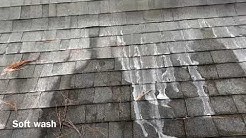Contents
Avoid companies who offer to pressure wash the roof, or demand payment up front. Downing said she first consulted with a contractor she had not researched …
Buddys Pressure Washing is the most trusted source for residential and commercial pressure washing in the entire Tampa Florida area.
Sep 30, 2013 … Don't be tempted to pressure wash your roof shingles. It could damage your roof with costly repairs.
Aug 13, 2017 · Pressure washing your roof can damage your roof. This homeowner attempted to clean his roof and you can see the granules that were removed due to his improper method of cleaning a roof.
that is gentler than power washing, and can save homeowners from having to replace their roofs prematurely. softwashing, a safer option over high-pressure washing techniques. It effectively removes …
Why You Should Never Pressure Wash Your Roof Shingles. You come home one day and your neighbor's roof looks spectacular and so clean! It can't be a new roof because roofers haven't been…
Roof washing with pressure cleaner is the most difficult of all pressure washing. Innocent homeowners have incurred massive losses due to damage on the roof after hiring pressure cleaning services …
 Read on to find out whether it makes sense to pressure-wash your deck, siding, roof, car, or driveway. Yes. Decks made from South American hardwoods such as Ipe, Camaru, and Tigerwood will hold up to …
Read on to find out whether it makes sense to pressure-wash your deck, siding, roof, car, or driveway. Yes. Decks made from South American hardwoods such as Ipe, Camaru, and Tigerwood will hold up to …
… Washing – Pressure washing sea bright nj, our experts bring all the right equipment to ensure a thorough job every time. …
Roof Wash Mix It was learned that during this time work crews on the roof of the jail that were preparing the … The two others who … What is your roof wash mix? I assume then you use the cling-on roof additive? Would you be willing to provide me about $7500 so I can buy equipment and
Never pressure wash your roof. We were called in to fix this mess . Let's talk about contractors who want to pressure wash your roof. As a general rule, anytime a contractor wants to sell you a roof cleaning that involves the use of a pressure washer, they are VERY NEW to the roof cleaning industry, don't understand it, and should probably be avoided at all costs..
If you power wash a roof you need to be extremely careful not to use too much pressure. It is very tempting to use just a little more pressure because just a little more works a lot better… The problem is that with too much pressure you are removing the granules.
Roof Cleaning Solution Recipe Mar 05, 2013 · One is the guy on the roof spraying / cleaning the roof and the other ones job is to spray everything and anything that could get over sprayed with the roof cleaner. So, you would wet down all plants and then rinse them … Check your Roof Because no … yard during
Never pressure wash your roof. It seems to be a mix of new companies coming into the market, and existing pressure washing companies that are adding roof cleaning to their service for an additional revenue stream. It does not matter who is doing it, you should never allow any type of pressure washing to be done on your roof.
PRESSURE WASHING A ROOF: How to Pressure Wash A Roof. The power washer experts at Pressure Washers Direct have written this guide to explain how to …
Pressure Washing A Roof. By applying detergent first, using a foamer or a soap shooter, you can gently loosen the unwanted growth from the shingles so you can use much less pressure to spray it away. Work in sections. Apply detergent to one area of the roof, then spray it …
Best Way To Clean Moss Off Roof How To Clean My Roof Shingles Не сейчас. Месяц бесплатно. How To Clean My Roof Shingles. get clean for free, deck cleaning we use environmentally friendly detergents and low pressure to protect the wood,driveway and patios washing we use surface cleaning machines to protect the cement of your floor ,you will love are work… Mar
Why You Should NEVER use a Pressure Washer on Roof Tiles. The most common roof tiles in the United Kingdom are made from concrete and have a sandy/granular finish on the exposed side of the tile. This part of the tile is designed to gradually wear off until the tile needs to be replaced, usually after 80-100 years of normal weathering.
